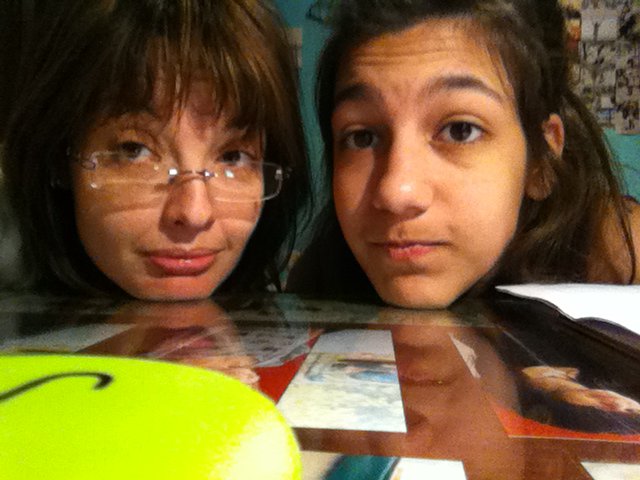Failure is an experience that many, if not all, teachers and students have been through. In this issue Chuck Sandy, Jessica Brook and Theodora Papapanagiotou share their personal stories and give ideas on how we can learn from getting it wrong.
|
|
|
|
Failure is an experience that many, if not all, teachers and students have been through. In this issue Chuck Sandy, Jessica Brook and Theodora Papapanagiotou share their personal stories and give ideas on how we can learn from getting it wrong.
|
|
|
|
 by Chuck Sandy
by Chuck Sandy
I hadn’t realized my 10th grade math teacher had been watching me struggle, but as I closed my book and put my pencil down in frustration she walked over and asked me if I was alright. “No, I’m not all right. I can’t do this,” I said. She pulled up a chair and sat down. Then she asked, “are you using everything you’ve been given to solve the problems?”
Thinking she might be criticizing me, I got defensive. “Of course I am,” I said angrily. “I don’t think you are,” she replied as she opened my book back up to the proper page. “Who have you asked for help?” I thought about this for a moment and said, “No one.” She handed me my pencil and said, “then you haven’t used everything you’ve been given to solve your problems. Let’s get to work.”
As I noted her use of the word let’s and her shift from the problems to your problems she asked if I was willing to let her help me. I agreed I was and she promised that she would. Then for the last few weeks of that semester between classes, during class, and after school she set aside time to work with me.
Whenever I didn’t understand something she’d say, “so you’re not ready do to X yet and that’s ok. I know you can do Y though, so let’s go back to that point and figure out where we got lost. Meanwhile, try this.” Then she’d offer me some new strategy to use on a problem I could do, and when I used that successfully she’d congratulate me. “See, I knew you could do it,” she’d say. Eventually I started to believe her and as I did something changed inside me. I started to feel good about myself and looked forward to her class. Maybe I wasn’t a failure after all.
That’s why it wasn’t a catastrophe when my high score on the final exam wasn’t enough to save me from getting an F in the course. Yes, I failed the course, but because this teacher had given me a place to stand, a way forward and a path out, the second time through her course I came pretty close to getting an A.
More importantly, I finally broke out of the cycle of failure I’d gotten trapped in.
Over the years I’ve thought a lot about this teacher and the way she’d helped me to break the cycle. By the time I’d gotten to her class in 10th grade I knew for a fact that I couldn’t do math. I was also pretty sure I was a loser and that everyone knew it. Though I could tell you the long story about how I’d come to believe this about myself, I don’t really need to because my story could be anyone’s story.
You hit a bad patch, skip a few classes, and now you have no idea what’s going on. Then you move to a seat in the back of the class and hope no one will notice how lost you are. You haven’t done your homework because you don’t know how so why even bother? Then what’s this? It’s a quiz on which you just scored close to zero. All you want to do is get out of that room where you’re failing and find some place where you possibly could feel better about yourself.
But that’s when your teacher decides to pull you over and tell you that you really need to try harder and wonders why you’re so unmotivated and says something like “you’re going to fail my class unless you shape up” without giving you a clue about how you might do that. That’s what my 6th grade math teacher told me before adding “and don’t ever come to this room without your homework done.”
All that talk does is scare you and when you do come back with your homework done it’s all wrong because you still don’t know how to do it. But all you get is that lecture again and then you fail and you fail and you fail and now it’s not just that one class. It’s everything and you’re sinking fast and there’s no place to stand until you get to the 10th grade and you’re lucky enough to have a teacher who gives you one. Yet there’s more to the story as there always is.
There’s also the story about how much easier it is to turn on the television or hang out with friends than it is to work at something you’re not good at. Then there’s the story about not fitting in with your peers or maybe you come from a family who doesn’t have much and your whole life is a struggle, or maybe it’s that you’re overweight or your clothes are out-of-style hand-me-downs or you don’t feel well or you’re depressed but you know this part of the story, too. There are a million reasons why someone might start the slide into failure and wind up in danger. Failure is complex, multi-layered and human. No one is immune.
Whatever the reasons students might get trapped in a cycle of failure, I’ve never seen any of mine get out of that trap because someone’s given them a lecture about trying harder or because they’ve seen some meme on social media about how failure is just a part of success so stand up when you fall down. The only times I’ve seen real change made were those times when someone pulled up a chair like my 10th grade math teacher did and offered a place to stand. Then even if a failing grade should still happen, that not really failure because there’s now at least the possibility that the cycle of failure could be broken.
I learned this as I was failing a 10th grade math class. None of this is easy and there are no guarantees it will work, but I’ve learned that the way out begins by asking are you alright? Are you using everything you’ve been given to solve this problem. Who have you asked for help? Well, I’m willing to help you if you want some help and yes, I do understand you can’t do this now, but I know you can do this other thing and here’s how we could get started on that.
That this offer of help is sometimes rejected hardly matters. Even pulling up that chair and making the offer let’s students know that their struggle has been acknowledged, that there’s a place to stand if they want one, that there is a way forward and a path out. It says I know this is hard for you but I’m here if you need me. You could open your book, pick up your pencil, and we could begin here.
 by Jessica Brook
by Jessica Brook
“Doing a project that is truly complex and difficult tests your real ability… the thing we most fear with regard to failure is our own self-acknowledgement, that we really don’t exactly know what we’re doing.” Milton Glaser
This time last year, I was halfway through my first proper Action Research enquiry, and I definitely didn’t feel like I knew what I was doing. Three years after finishing the DELTA I had been itching for a new challenge. Although I was very keen to start a master’s, I wasn’t so keen on 2+ years of distance learning. Looking at various MAs online I came across a new course with the University of Leicester, a Post-Graduate Certificate in Action Research, a much more doable seven months. I was a stranger to formal research, although throughout my teaching career I’ve tried hard to develop through reflective practice. Indeed, this is what has always kept it interesting, so I was really motivated to step it up a level.
Nine months later, frustrated and dissatisfied, I was secretly pleased to see the back of it. I felt that nothing I’d set out to discover had been clarified as I’d hoped, and if anything I just had more questions. However, with time and reflection, I began to realize just how valuable a learning experience it had been. I’m now infinitely better-equipped to run small-scale research, to guide and encourage other teachers in their own development.
Bearing in mind the many hiccups I experienced along the way, this is the advice I would give.
An excellent bit of advice my tutor gave was “it’s better to write a lot about something small than the other way round”. I completely disregarded this advice, my research question involving new paradigms in listening instruction, and how best to incorporate them in general English syllabi, as well as teacher training. In hindsight, picking just one technique would obviously have been much more manageable. Posing your research goal as a question helps to focus, but the size of the project inevitably grows with its ambition. So think carefully about what you want to explore, how much time you want to commit, and whether your area of focus overlaps with your students’ needs, your colleagues’ interests, and/or the goals and objectives of your institution. Does it solve a problem? Or respond to a student survey? You’re also more likely to gain support this way. Mine admittedly did all three, but would have been just as useful on a smaller scale.
What’s the difference between bog-standard Reflective Practice and Action Research? This debate continues to rage in academic circles and some would argue there isn’t a distinction. However, if you’d like to take your findings to a wider audience, be rigorous, and keep an open mind. It’s very easy to start off unconsciously expecting a particular outcome, but things may well not turn out that way. And it’s within the ”mess” of Action Research that interesting things happen. You won’t know if you don’t have the data to explore, so with that in mind, record everything, chuck nothing. One of my most unexpected and interesting insights came from my field journal. Meant as a personal record, it became a rich source on the different, often conflicting, roles we take on when facilitating planning, observation and feedback sessions.
Thinking about who you want to involve is really important. Collaborating with colleagues is extremely rewarding, but bear in mind the practicalities. Put together a schedule detailing the main commitments with time estimates and communicate it in advance. Getting students to participate in the process empowers them – after all they’re at the heart of what we do – but make sure they know exactly what’s involved, seek permission, document it. Again if you have any plans to take your findings to a wider audience (i.e. outside your own school), this ensures your research is ethical. I decided on a collaborative approach known as lesson study. Working alongside two other teachers was intense and challenging, but the detailed, positive comments in their exit questionnaires made it all worthwhile.
Picture the scene. You and your colleagues spend hours planning a dynamite observation lesson, which you plan to video on the only day that teachers, timetables, and classes align like a once-in-a-century solar eclipse. The lovely case-study students have agreed to give up an hour of their time after class for you to interview them. You arrive that morning to discover all classes have had to be relocated to a nearby hotel due to noisy building work. The said hotel has terrible audio equipment and all the plug sockets are deliberately positioned to prevent effective video recording, or so it feels. Unfortunately, these things just happen in teaching. Don’t throw in the towel, do your best, record, and note-take whatever you can. Learn, move forward, and look for solutions.
Perhaps my biggest disappointment was that I left the country before my write-up was complete, so I wasn’t able to share it with my colleagues face-to-face. Reporting your findings gives a sense of resolution and regardless of how worthwhile you feel it was, people will appreciate your efforts. It’s also a great way to raise your profile and connect you to a wider community and there are many outlets for doing so, iTDi being just one example. Give a talk, submit an article, start a blog, make a poster for your office!
I’d be lying if I said my project was a complete failure, far from it. In fact, my main failure was not realizing at the time how much more I would learn from the process itself, rather than the final product. Actually, I do have a more fully formed and practical approach to listening instruction in my own classroom, which is what I’d set out to investigate after all.
“There’s only one solution… Embrace the failure!” Milton Glaser
 by Theodora Papapanagiotou
by Theodora Papapanagiotou
A definition from Cambridge dictionary says:
Failure (noun) – the fact of someone or something not succeeding.
The meeting was a complete/total failure.
I’m a bit of a failure at making (= I cannot make) cakes.
I feel such a failure (= so unsuccessful).
The dictionary does not help me much, though. Trying to find the definition that would be right for me was a complete failure. In my understanding, not meeting a goal does not mean being unsuccessful, it is not the end of the world. It just means that we were not ready at that particular moment, or that it was not the right time for us, at least not yet! When we feel a failure, all we want to do is give up. I believe that, on the contrary, that’s exactly when we need to try one more time, and then maybe once again… and again, if necessary.
As a teacher, I tend not to use this word and I will tell you why. Foreign language teaching in my country is absolutely exam-oriented. Students learn one or two foreign languages at school, but they also attend courses at private language schools to actually “learn a language”. “Learn a language” in this case always means “pass an exam in order to get a certificate”. Certificates are everything, they last forever if you want to work as a public servant. As a result, students start learning English at a very young age (usually 5 years old) and keep going until they get the desired certificate. EFL exam industry thrives in Greece and children take C2 CEFR level exams at 14.
And yet they “fail”. They fail because the language level is way too demanding, because they have loads of homework assigned either by school or by private tutoring centres, or maybe because they have taken up more extracurricular activities than ever. They fail because they are too young to understand texts in C2 level – they do not even read newspapers or watch the news in their own language. They fail because they are taught to prepare by studying three test books and learning huge lists of vocabulary by heart. In the end, most of these students do not pass the exam…
But does this really mean failure? And if so, failure for whom? Failure for the student who has not passed the exam? Failure for the teacher? Why have we failed?

In my opinion, we have missed our goal. Our goal is to make students use the language, develop their basic interpersonal communication skills as well as their cognitive academic language proficiency. In the real world, having a certificate means nothing if you cannot use what you have learned. Of course, certificates are a mere necessity in order to study, get a job, have an officially documented proof to indicate your knowledge. But what happens, for example, if you passed your language exam at 14 and have not used the language ever since? I have seen so many people not being able to communicate in English after years of learning the language. It is certainly sad, but it is not failure. You are never a failure if you are willing to improve yourself.
So, what can we do in order to meet our goals? As teachers, we should:
Whatever you do, remember this: not passing an exam does not make you less intelligent, as well as having students who did not make it in an exam does not mean that you are a bad teacher. “Failure” is just a word which is overrated. Keep moving!